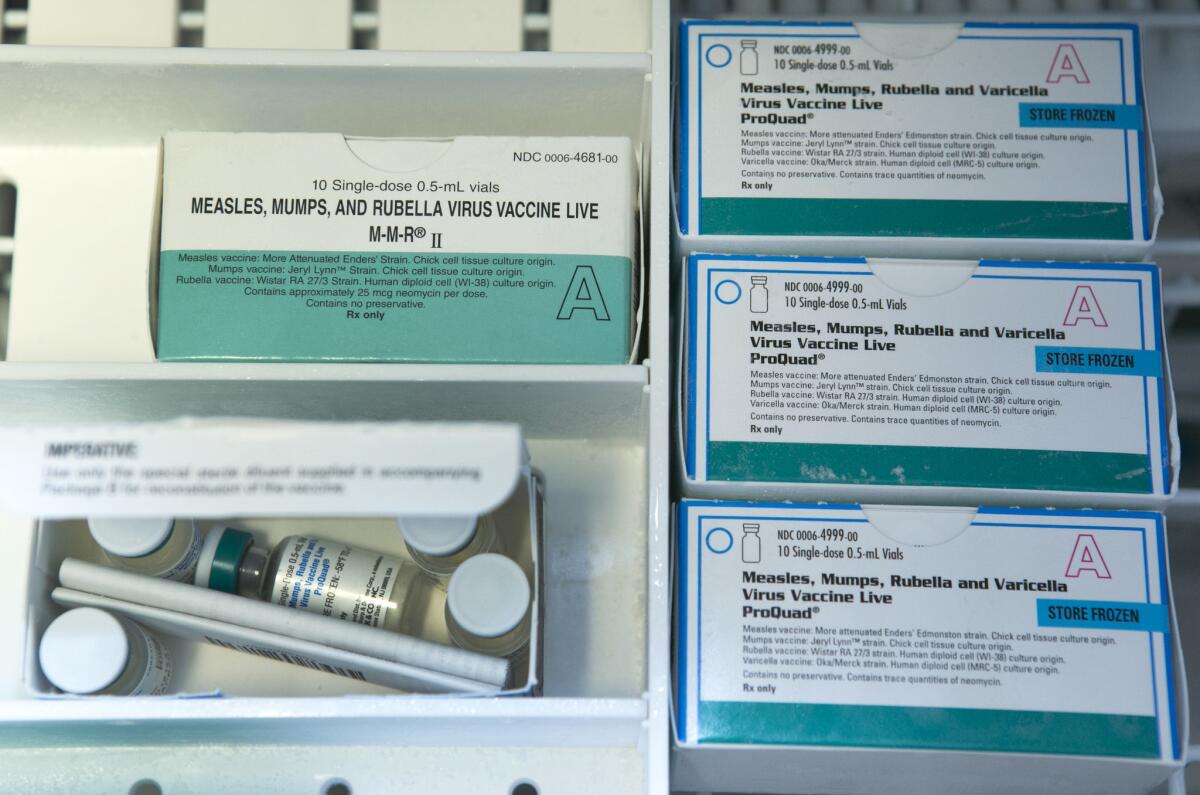Vaccines: Delayed immunization schedule can be deadly, experts say

- Share via
Some parents have said they’re not anti-vaccine, but that they want to delay vaccines, or spread out shots, for fear of overwhelming a baby’s immune system.
What do experts say?
“The idea of overloading the immune system is a false concept,” said Dr. James Cherry, a UCLA research professor and primary editor of the Textbook of Pediatric Infectious Diseases. “It’s absolute misinformation.”
In fact, the body reacts to a bacterial infection to the throat far more aggressively than it does to the measles vaccine. The body needs to develop roughly 3,000 antibodies to counteract the 3,000 proteins in a typical strep throat.
The measles-mumps-rubella vaccine, known as MMR, has only about 40 proteins, so the body needs to develop only 40 antibodies to handle the vaccine, from which it learns how to keep the body healthy from measles, mumps and rubella.
Why is a delayed immunization schedule harmful?
Delaying vaccines puts a child at greater risk of contracting diseases that can cause severe illness or death, experts said.
Where did the U.S. anti-vaccine movement come from?
It can be traced to a 1982 documentary, aired on an NBC affiliate in Washington, D.C., titled “DPT: Vaccine Roulette.” The show claimed there were serious questions about the shot’s safety, and then showed images of children with severe mental and physical disabilities, wrote Dr. Paul Offit, infectious-diseases expert at the Children’s Hospital of Philadelphia in his book “Deadly Choices: How the Anti-Vaccine Movement Threatens Us All.”
The documentary was wrong and debunked, Cherry said. One concern raised in the report was the development of the onset of something called “vaccine encephalopathy,” in which children purportedly experienced brain damage after immunization.
Numerous studies found that the contention was wrong, including one that Cherry worked on looking at patients in Denmark. “We showed there was no relationship to any severe neurological illness,” Cherry said.
What about autism?
A report in 1998 in the British journal Lancet purporting to show a possible link between autism and the measles vaccine was later declared to be “a deliberate fraud,” wrote Dr. Fiona Godlee, editor in chief of BMJ, formerly the British Medical Journal.
An editorial by Godlee accompanied a report by British investigative journalist Brian Deer documenting how the author, Dr. Andrew Wakefield, manipulated data in his attempts to prove something that he “knew” before he started his research.
The medical history of the patients cited in the study had been altered to make Wakefield’s claims more convincing, the report found. The Lancet retracted the paper in 2010, and British officials revoked his license to practice medicine.
What about the mercury once used in childhood vaccines?
The mercury once found in routine childhood vaccinations — ethyl mercury — is nontoxic, eliminated quickly and doesn’t accumulate in the body like the methyl mercury found in fish. Ethyl mercury is different from methyl mercury; ethyl alcohol is found in wine and beer, while drinking methyl alcohol — also known as wood alcohol — can cause blindness, Offit wrote.
More to Read
Sign up for Essential California
The most important California stories and recommendations in your inbox every morning.
You may occasionally receive promotional content from the Los Angeles Times.











